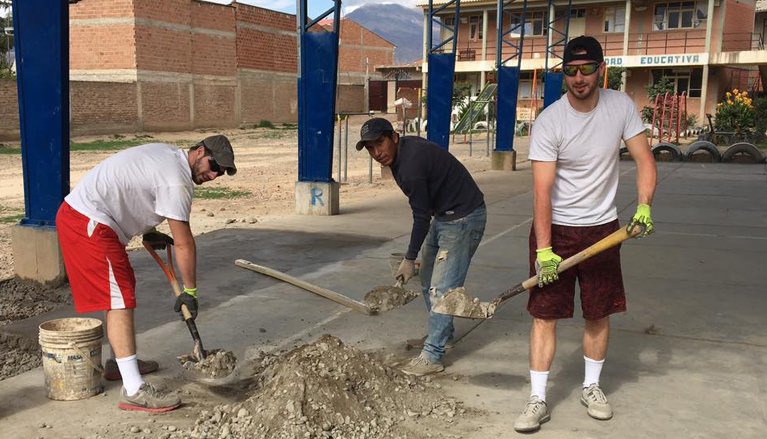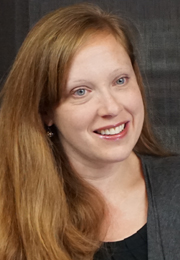At SRU, volunteering is in our DNA

A group of SRU students recently took part in a 10-day CareBreaks trip to Bolivia, aided in an elementary school construction project.
Jan. 29, 2016
SLIPPERY ROCK, Pa. - When it comes to lending a hand and helping out fellow humans, animals in distress or a nation reeling from a natural disaster, the rest of the country has nothing on the students of Slippery Rock University.
Although figures from the Bureau of Labor Statistics show volunteer rates nationally dipping to just 25.3 percent, the lowest rate since 2002, SRU's rate continues to grow annually.
Nearly 68 percent of all SRU students participated in some form of service during the 2014-15 academic year, providing an economic impact of $1.6 million dollars and raising more than $47,000 in charitable donations.
Not too shabby, eh?

VARNISH
"The University's goal is to not only educate students on an academic level," said Julie Varnish, SRU assistant director, Center for Student Involvement and Leadership, "but to expand their knowledge base in terms of their out-of-classroom experiences by promoting leadership development through community outreach in order to help them become good, global citizens."
Varnish added that the CSIL offers students opportunities to participate in on-going community service programming that addresses critical needs in local, national and international communities, and in the process, helps to enhance the students' leadership skills. The service experiences help to facilitate their intellectual growth and encourage a lifelong commitment to civic responsibility.
Each year, students can choose from more than 150 different volunteer opportunities in which to participate. Some are coordinated in conjunction with a faculty member who makes a service project part of his or her coursework. These have included: tutoring and mentoring local school children, environmental clean ups, blood drives, food bank and school supply initiatives, building houses for Habit for Humanity and working with adults with special needs.
In addition to meeting the service component of many majors, by volunteering, SRU students develop valuable skills and a sense of community, empathy, commitment, dedication, understanding, initiative and friendships, while helping build and enhance the communities in which they live and work, said Charlie Judge, assistant director, CSIL.
Additionally, many student clubs and organizations lend support to those causes they feel most strongly about, such as cancer, leukemia and diabetes research, homeless and hunger issues, or helping those with special needs. One such example is SRU's chapter of Best Buddies.
Best Buddies, a 501(c)(3) organization, is a global volunteer movement that creates opportunities for one-on-one friendships for people with intellectual and developmental disabilities.
Founded in 1989, the program has grown to include nearly 1,900 middle school, high school and college chapters, serving participants in each of the 50 states and more than 50 countries, impacting nearly 900,000 individuals.
At SRU, the group is comprised of more than 75 students from a variety of majors, including special education, therapeutic recreation and adapted physical activity among others, that are paired with individuals from the ARC of Butler County.
According to Jake Paterline, an SRU early education/special education major and president of the University's Best Buddies chapter, in addition to hosting group and awareness events, buddies spend a great deal of one-on-one time together, including a minimum of two outings and four phone calls, texts or emails per month.
"The joy you see on a buddy's face, or the lift you hear in their voice when you call," said Paterline, "is the whole reason I volunteer. It's an amazing feeling."
Examples of student volunteerism abound. Last December, members of the SRU men's basketball team lent a hand to the Slippery Rock Community Library to help get ready for the library's "Mega Used Book Sale" by unloading and sorting truckloads of books in preparation for the event.
"Becoming involved in a community, locally or beyond, is a transformative experience that can really give a student an edge after they graduate," said Varnish. "Employers like to see that students have accomplished more that just classroom learning. When a student steps outside the lecture hall and gives of themselves and their time to become civically engaged, they've shown that they care enough to take that extra step in becoming a whole person."
Beginning with the Spring 2016 semester, CSIL is refining the focus for student volunteer opportunities to align with the Clinton Global Initiative University and its five areas of focus: education, environment and climate change, peace and human rights, poverty alleviation and public health.
"We felt that by providing those concentrations as a guide," said Judge, "that it would help to further focus efforts, provide an identifiable brand for the University and help students more greatly realize that their efforts can go beyond Slippery Rock and have a global impact."
Building on the successful model of the Clinton Global Initiative that brings together world leaders to take action on global challenges, President Bill Clinton launched the CGIU in 2007 to engage the next generation of leaders on college campuses around the world.
According to the CGIU website, each year the entity will host a meeting where students, university representatives, topic experts and celebrities will come together to discuss and develop innovative solutions to pressing global challenges. President Clinton and Chelsea Clinton will host CGIU 2016, April 1-3, at the University of California, Berkeley. The meeting will bring together more than 1,000 students in an effort to make a difference in CGIU's five areas of focus.
As a prerequisite of attending the CGIU meeting, students must develop their own "Commitments to Action": new, specific, and measurable initiatives that address pressing challenges on their campus, in their local communities, or around the world. Previous commitments have ranged from manufacturing wheelchairs for developing countries, establishing campus bike share programs, creating free vision clinics and developing e-learning applications for mobile phones.
A delegation of six SRU students will be attending the CGIU meeting, including: Samantha Marfisi, a senior sustainable management major from Bethel Park and Kelly Ligon, an undeclared junior from Lower Burrell, who have partnered on environment and climate change; Ashley Beal, an environmental geoscience major from West Mifflin, Andrew Moore, a junior sustainable management major from Eudora, Kansas, and Dale Chappell, a graduate education student from New Castle, who have partnered on poverty alleviation; and Emily Reed, a senior non-profit management major, who submitted under peace and human rights.
Since 2008, students involved through CGIU have made more than 5,500 commitments, with nearly $2 million in funding being awarded to those actions through CGIU.
In addition to local community service, SRU's CareBreaks program provides students with volunteer opportunities on both national and international levels.
Since 1994, more than 1,200 SRU students, faculty and staff have logged in excess of 200,000 hours in 26 U.S. cities and seven countries tutoring children, building low-income housing, assisting the homeless and hungry, protecting the environment and building the University's reputation as a place where students develop a strong ethic of service.
One recent excursion saw Christine Pease-Hernandez, assistant professor of communication, lead a group of 14 SRU students to Bolivia on a 10-day trip to aid in the construction of the Unidad Educativa Cohachaca Chico School. The group laid brick, mixed concrete, bent rebar and cut and lay tile flooring in helping to widen the school's concrete basketball court.
In addition to manual labor, the group also had the opportunity to learn about Bolivian culture through a variety of excursions including visits to the Cristo de la Concordia statue, the Convent of Saint Teresa, the La Cancha market and President Patiño's Palace.
"Being immersed in a different culture, with people that speak a different language, eat different foods, yet are still able to find a common ground in being able to work together and make a difference in a community, are all defining moments in the lives of these students," said Pease-Hernandez.
"Not only was it exciting to travel abroad," said Anna Buffalini, a senior communication major from Pittsburgh, "but it was something I didn't view as (community) service or work. We were just helping someone who needed our assistance. When you add in the opportunity to learn about another culture and create bonds with another people, the experience is really not like anything else I've experienced. Without a doubt, the experience helped build and shape part of my character."
Jamie Romine, a senior public health major from New Castle, said that for her, part of the attraction to an international effort was in pushing her "outside the norm."
"When you can submerge yourself in a language you don't understand, that's spoken and broken on both ends, but still find a way to come together and work as one toward a common goal, the reward is fantastic," Romine said.
Varnish said CareBreaks trips not only take students out of their comfort zone, but also help to broaden the students' perspective and instill a passion for service.
"(CareBreaks) take the educational experience at SRU a step further," Varnish added. "Without a doubt, the trips are incredibly transformative. Fear of the unknown can be unnerving, but the growth of mind and spirit we see in the students upon their return is incredible.
"These are experiences they can draw upon for the rest of their lives and know that they had a hand in making a difference in not only the lives of others, but themselves as well."
MEDIA CONTACT: Robb King | 724.738.2199 | robert.king@sru.edu

